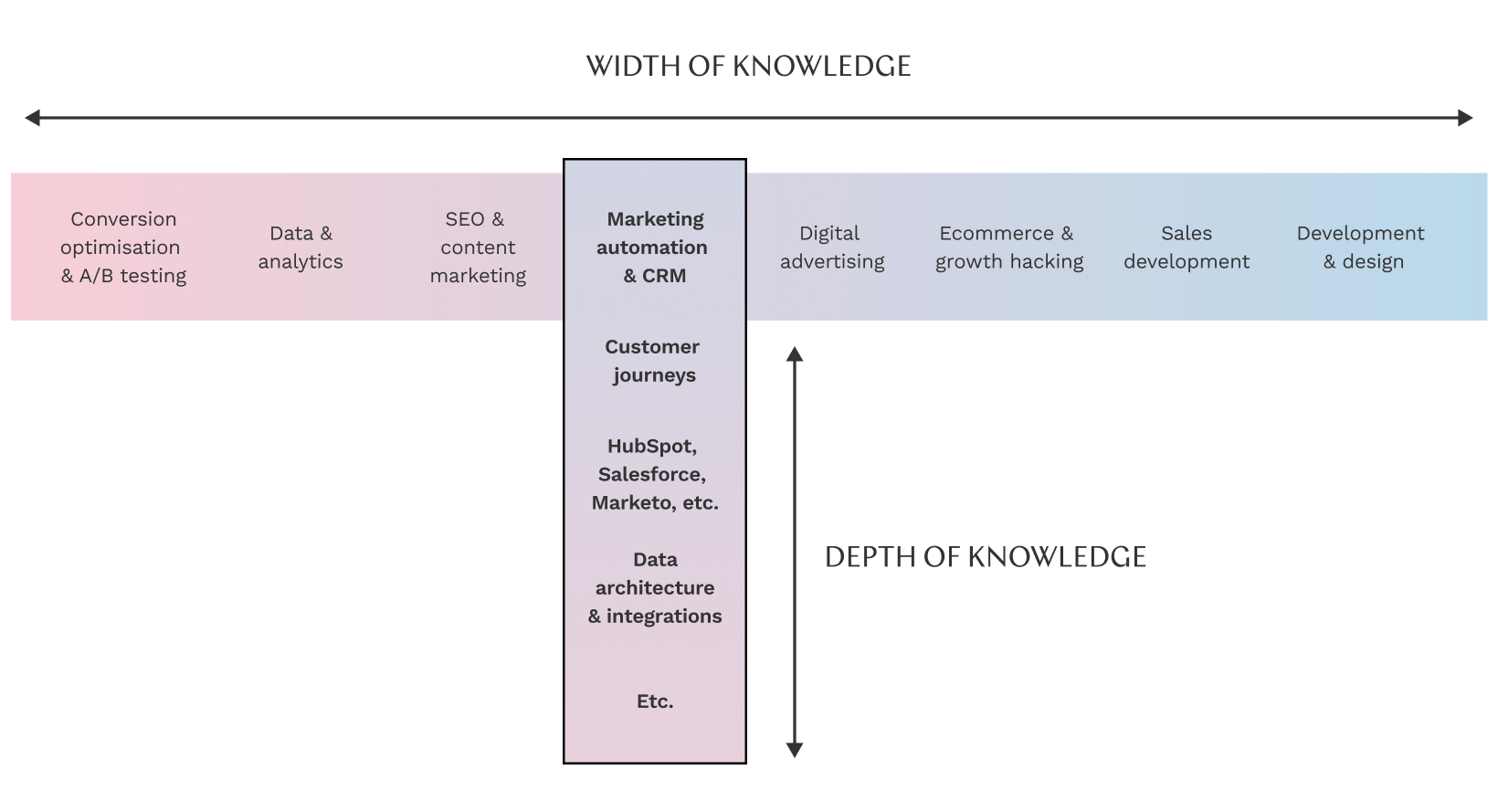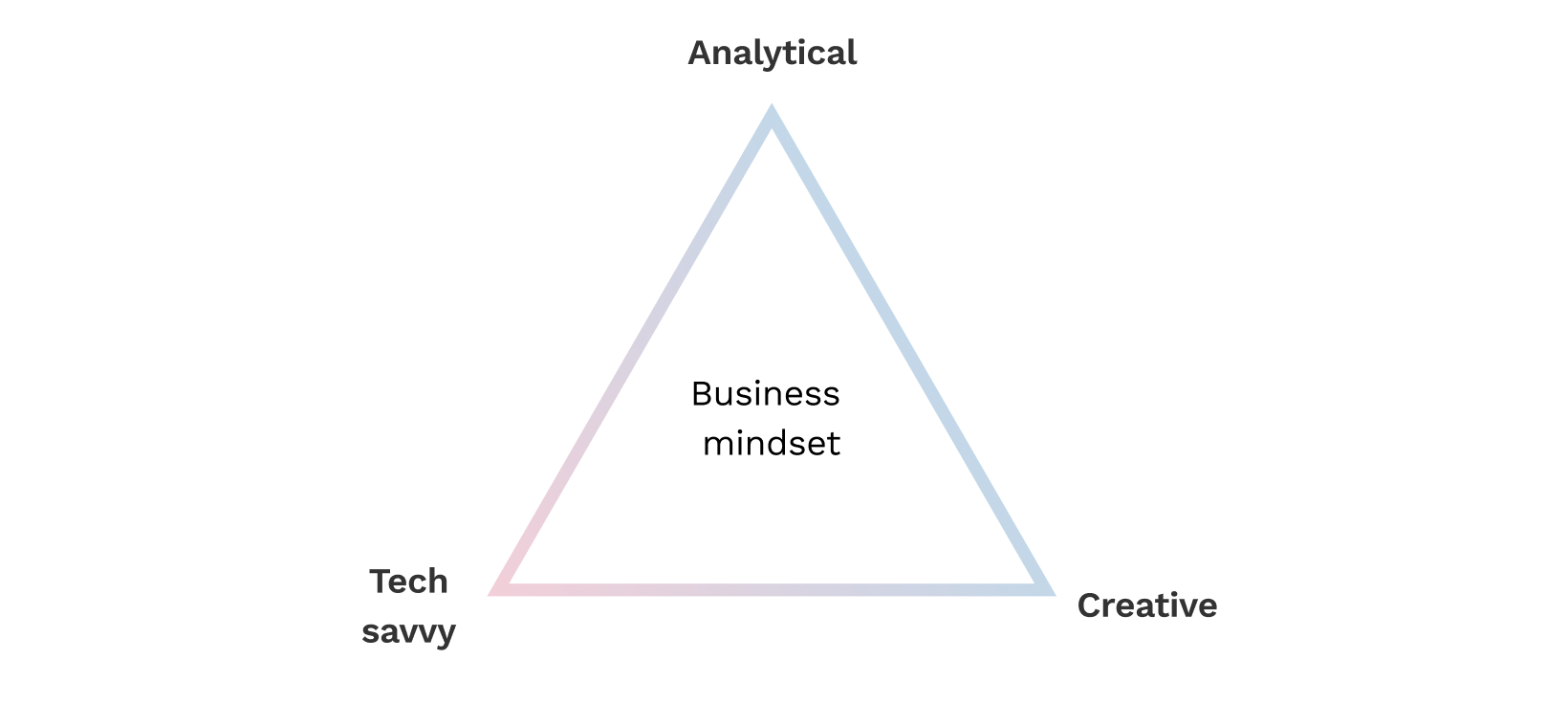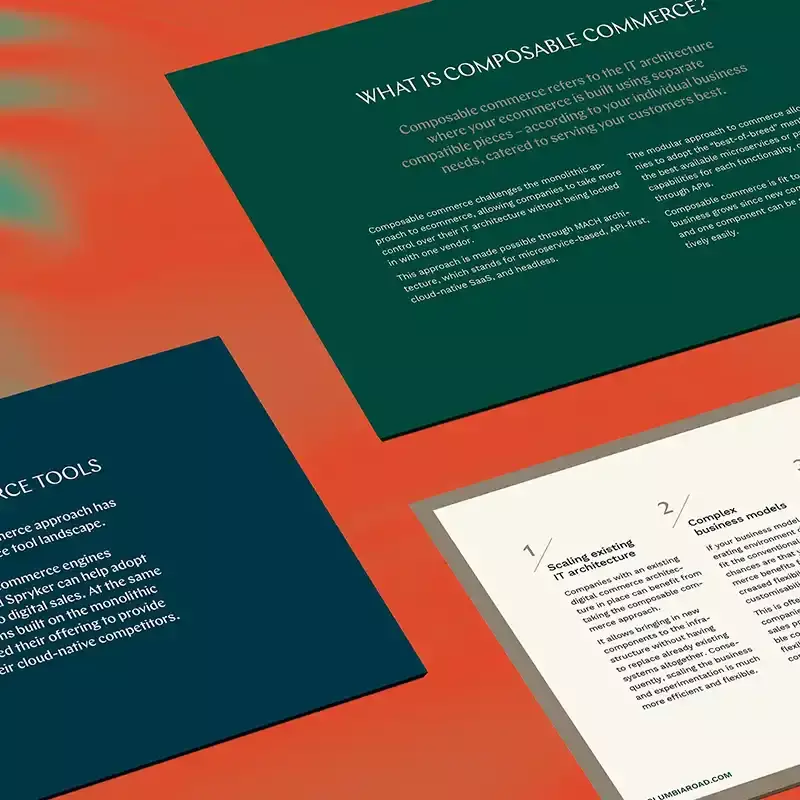Check out our open MarTech positions
We're constantly looking for talented people to join our crew! Take a look at our open positions.
With the call for specialised generalists louder than ever, the demand for marketing technology experts is on the rise. In this article, we unveil the mystery of a T-shaped marketer and how you can become one.
Unlocking the martech mystery
Imagine a chilly winter day prompting you to search for a cosy jacket online. A quick Google search yields numerous results, and after investigating the top 5 options, you land on a brand website. As you explore the selection, a pop-up appears, enticing you with a 15% discount for signing up for their newsletter. Excitedly, you fill out the form, receiving a thank-you message and a discount code in your inbox.
The next day, while scrolling through social media, an ad for the same brand catches your eye. You remember the 15% discount and decide to go ahead and order the jacket. Your future cold winter days are secured!
Behind these seamless interactions lie various marketing technology solutions, orchestrating a journey all the way from awareness to purchase. In short, marketing technology refers to the use of software, tools, and digital technologies to execute, manage, and analyse marketing strategies and campaigns effectively. The jacket brand had most likely invested great resources into functions such as search engine optimisation (SEO), ecommerce, conversion rate optimisation (CRO), marketing automation (MA), paid media, and data analytics, which all played a crucial role in the jacket purchasing journey.
The rising demand for martech skills
As the pandemic hit in 2020, online sales skyrocketed. The surge in digital commerce naturally also accelerated the adoption of martech solutions, as companies needed great tools to help them stand out in the fierce online competition.
Indeed, the number of marketing technology solutions available worldwide has drastically grown, according to Statista. In 2023, over 11 000 martech solutions were available to industry professionals. Compared to the figure recorded before the pandemic – 7040 in 2019 – there was an increase of almost 60 per cent.
However, there's a glaring gap between the increasing demand for these tools and the workforce equipped to harness their potential. In a survey conducted by Odyssey in 2023, 70% of company executives admitted a lack of resources and skills for reaching their martech goals. While more and more advanced martech tools and solutions emerge, more talent is also needed. There is a pressing need for skilled martech professionals, and the gap is yet to be filled.
Wanted: T-shaped marketers

Navigating the diverse landscape of martech can be challenging, often requiring a "T-shaped" skillset. The concept refers to marketers having a broad understanding of various martech competencies, such as data, SEO, marketing automation, CRM, and content management (horizontal part of the T). While possessing general knowledge in multiple areas, focusing on one or two core competencies deepens the skillset, forming the vertical bar of the “T” that captures the depth of knowledge in a selected area.
T-shaped marketers are not specialists. They are generalists with one or two specialties. Nobody can master it all, but with a T-shaped skillset, you could get pretty close. Take this as an example: A T-shaped marketer specialised in conversion optimisation could not only help implement conversion optimisation experiments on a website but also ideate how to generate leads through a Meta campaign or nurture them with marketing automation. They might not have hands-on experience in either, but understanding how to utilise these functions along the customer journey to reach a shared goal can be extremely valuable.
In 2024, more and more martech professionals should be aiming for a T-shaped skillset. Acquiring foundational knowledge across multiple marketing domains allows the creation of well-integrated, seamless marketing strategies instead of siloed channel-specific tactics. Being able to fully understand the complete customer journey and the essential tools and tactics utilised along the way essentially leads to more customer-centric and holistic marketing – and ultimately, better business results.
The set of skills T-shaped marketers should acquire varies depending on their chosen specialisation area. However, some characteristics that often unite them include tech-savviness, creativity, and an analytical mindset. The combination of these attributes forms a robust foundation for grasping bigger visions and driving business results.
Choosing which core competencies to build relies on the existing skills of the team and the professional growth wishes of the individual. At Columbia Road, we have seen an increased demand for professionals who master the world of MA and CRM, and are constantly looking for technical experts in areas like SEO and Analytics.

The journey to T-shaped expertise
Excited already? So are we! Next, let’s discuss some of our tips for how to brush up your martech skills on the way to becoming a specialised generalist.
1. Start from the basics – the horizontal part of the T
To become a truly T-shaped marketer, you have to audit your skillset first. What do you already know? What is your bread and butter? What are your weak points?
A general understanding of the basic marketing principles is a must, and so is the possession of professional qualities such as tech-savviness, creativity, analytical skills, and project management. On top of these, you should start building a basic level of understanding of the different martech facets. We at Columbia Road have categorised them into eight high-level areas:
- Conversion optimisation & A/B testing
- Data and analytics
- SEO and content marketing
- Digital advertising
- Marketing automation and CRM
- Ecommerce operations and Growth Hacking
- Sales development
- Development and design
Remember, you don’t have to master everything – it’s the big picture that matters. Having a basic understanding of the role, value, and key elements of each area is enough. Let’s take Search Engine Optimisation as an example: broadening your T with a SEO component would require recognizing SEO’s role and importance, and what can be achieved by utilising it on the customer journey. You would be able to name the key elements of the SEO and would have a little bit of knowledge around the classic tools and technologies involved, but you would not necessarily need to have any practical experience of using them.
There are plenty of options for how to broaden your general martech knowledge. From structured higher education marketing studies and open university courses to flexible online learning platforms such as Udemy, Linkedin Learning, Coursera, and DataCamp – there are thousands of variations you can choose from. Many of the major martech service providers, like Google, HubSpot, and Salesforce offer a wide range of training material on their platforms, where you can earn product-specific certifications to showcase your expertise.
On top of the more official training platforms, the internet is full of material around digital marketing and martech – most of it for free! After choosing the topic you want to learn, skim through blogs and YouTube videos and follow thought leaders and professionals in that area. For instance, Analyticsmania and Simo Ahava offer great free resources around the world of digital analytics.
Finally, one of the best ways to broaden your skillset is to learn from others around you. Working in a team with different-minded and specialised professionals will widen your horizons without a doubt. Be curious, observe closely, and ask questions – questions that will help you lighten up any possible mysteries and understand the grounds for decisions.
2. Find your passion – the vertical part of the T
Great, you have become a martech generalist! The next step is to dig a little deeper and apply some depth to your T.
To become an expert in one or several competencies, you have to have some drive – otherwise things might get boring. Following the experimentation with different martech competencies, ask yourself: What were the things you truly enjoyed? What floats your boat?
Courses and certifications are a good starting point, but to truly master a topic, additional forces are needed. While theory lays a foundation, becoming an expert in any of the martech facets requires practical experimentation and work with the tools.
If you’re starting up with a new topic, try to find a free version of the tool you could try out. Most of the bigger service providers offer some trial accounts that let you play around in their environments. Try to apply your learning to real-world projects as soon as possible, gaining practical experience that enhances your proficiency. The best way to dig deeper is through trial and error and continuous experimentation, which is only possible if you confidentially take on new challenges.
The hard but also exciting part of mastering any martech-related topic is the fact that you will never be completely done with learning. The landscape is constantly changing with new emerging technologies, tools, and regulations, and staying on top of the game requires continuous engagement. Actively follow thought leaders and companies on LinkedIn, attend webinars, and stay updated with industry news. Embracing this proactive approach ensures that you remain ahead of the curve in the ever-changing martech landscape.
The beauty of it all? As you have hopefully noticed, there are plenty of paths to learn and grow in martech. Whether pursuing a formal degree in digital marketing or opting for online material and certificates, the key is to align your learning with the goals you have set for yourself, constrained by the time you can spend on training. The sky's the limit, and you are in the driver’s seat, choosing the right road for yourself.
The Data Handbook
How to use data to improve your customer journey and get better business outcomes in digital sales. Interviews, use cases, and deep-dives.
Get the book




